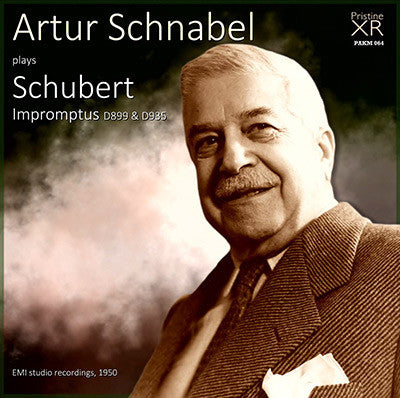
This album is included in the following sets:
This set contains the following albums:
- Producer's Note
- Full Track Listing
- Cover Art
Schnabel's brilliant Schubert Impromptus with beautiful, XR-remastered piano tone
"Schnabel’s uncomplicated, open-hearted response to the music underlines the benefits of wisdom and simplicity" - Gramophone
Artur Schnabel was 68 when he recorded the Schubert Impromptus for EMI in the early summer of 1950, with barely a year left to live. At the time EMI/HMV was still a 78rpm-only label, but early tape recorders had been installed in its Abbey Road studios and had been in use for a couple of years by the time this recording had been made. Yet despite returning to Studio 3, where so many of his other solo piano recordings had been made over the previous two decades, his engineers still struggled to capture Schnabel's piano tone well, something picked up on by reviewers ever since - as illustrated here.
My task, in taking on this project, was to see whether XR remastering might finally lay this criticism to rest. It wasn't an easy task - the piano is an unforgiving instrument that can quickly become clanky or boomy if you get it wrong. But here I think I have found a tonal sweet spot, and Schnabel's interpretations shine even brighter as a result.
I've also been able to address some quite significant pitch issues heard on EMI's various releases, where three of the recordings were sharp, the last two significantly so at A448 despite the earlier recordings coming in at A440. Elsewhere pitch drift has also been cured.
Andrew Rose
-
SCHUBERT 4 Impromptus, D.899
Recorded 6-8 June 1950
Abbey Road Studio 3, London
Matrix Nos. 2EA 14755/60
Issued as DB.21320, 21335, 21351 -
SCHUBERT 4 Impromptus, D.935
Recorded 8-9, 12-13 June 1950
Artur Schnabel - piano
Abbey Road Studio 3, London
Matrix Nos. 2EA 14761, 14765/7, 14774/8
Issued as DB.21382, 21500, 21611, 21557
Fanfare Review
No one has played this music with such depth and insight since Schnabel’s death
Artur Schnabel remains an inspiration for anyone who believes in his philosophy of performance, which simply stated is “play the music first, the piano second.” When he was coming of age at the turn of the century, the prevailing style was decidedly to put the piano first, often as brazenly as possible. It was a golden age of showoffs, and Schnabel’s seriousness rubbed against the grain of virtuosos who grumbled that he didn’t have the fingers to compete with them in the first place. That may be true, but as this classic set of Schubert impromptus indicates, Schnabel could go into the studio in 1950 at age 68, with less than a year to live, and execute the score with authority and passion.
If musical value were the only issue, one could declare flatly that no one has played this music with such depth and insight since Schnabel’s death. The first impromptu of the D 899 set recalls one of the most haunting songs in Winterreise, “Der Wegweiser” (The Signpost) in its melodic shape and the agitated march rhythm that accompanies it. I’ve never heard anyone impart a tragic undertone as poignantly as Schnabel does here. His quick repeated triplets were criticized for being wayward by the unknowing, who failed to recognize how Schnabel was faintly suggesting tears and sighs. That first impromptu is one of the great Schubert recordings, and the other seven are filled with their own unique artistry.
The fly in the ointment is the recorded sound, which has caused teeth to gnash for 60 years and rained down blows on EMI for botching the job. The piano has sounded harsh and clangy despite every new remastering by the company. Andrew Rose took up what he considered a very difficult challenge, first correcting the wrong pitch on some of the original 78s, along with “pitch drift.” But the big obstacle was the hard tone of the piano, which as Rose notes ruefully is an unforgiving instrument. Using his trademark XR process, he considers the final result a success. I agree, but not if your playback system features bright high frequencies. It requires a lenient treble and upper midrange to soften the sound to the point where you can play the recording at louder volume levels (there should be no problem if your goal isn’t to reproduce the piano as it sounds in the hall).
Otherwise, this is a cherishable release, one I can’t imagine any lover of the Schubert impromptus being without. Pristine Audio offers a variety of download and CD options at its web site.
Huntley Dent
This article originally appeared in Issue 38:3 (Jan/Feb 2015) of Fanfare Magazine.

